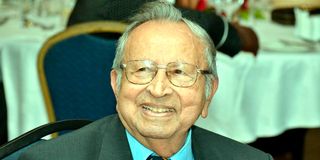How Yusuf Dawood demystified medicine

The late Dr. Yusuf Kodwavwala Dawood. The death of Yusuf Dawood last week robbed us of an author who had influenced Kenyan literature in three fundamental ways.
How do we eulogise a storyteller who told stories about life, health, illness and death in very normal words over the weekend to thousands of Kenya for decades?
How do we remember a surgeon who ‘taught medicine’ to thousands of Kenyans who read his column in the Sunday Nation newspaper?
Yusuf Dawood has left an enviable medical legacy in Kenya. But he probably bequeathed Kenyans a literary heritage that will likely remain unmatched for the foreseeable future.
Yusuf Dawood left tens of stories – long and short – for those with a sustained interest in literature. But it is his column, ‘Surgeon’s Diary’ that will remain etched in the minds of the readers of the weekend newspaper.
This column is only rivalled by Wahome Mutahi’s ‘Whispers’; ‘Masharubu World’ by Edward Gitau and ‘Coast Causerie’ by Edward Rodwell. But why does Yusuf Dawood stand out among fellow Kenyan newspaper columnists?
‘Surgeon’s Diary’ was a special column because it was about a doctor, his patients, his practice, diseases, health, and social, cultural and economic realities in Kenya. Dawood wrote about his work, who his patients were, what they suffered from, how they felt about themselves, how they responded to his diagnoses, how they dealt with his treatments, how some of them lived, what some of them believed etc.
Ordinary people
In the column, Dawood brought medicine and its practices and practitioners into the lives of ordinary people.
The reader could imagine the hospital operation theatre, ‘see’ the surgeon at work, encounter the doctor in his consultation room, ‘meet’ his patients, learn about medical procedures and how doctors dealt with (or should deal with) their patients, before, during and after surgery or treatment. All served with a good dose of humour, irony and melodrama.
Yes, the reader would laugh. But they would be laughing knowing that the story was about a ‘serious’ matter; a matter of life and death.
Why would this medical angle be important, anyway? Because Dawood was writing in society and for readers who were not necessarily familiar with medicine and health issues in general. Doctors were – and still are in some places – some kind of gods.
Not just anyone could be a doctor. Even in the precolonial period, medicine men or medicine women were much respected, if not feared people. Theirs was a world of mystery. To date, the doctor’s world – despite or in spite of the availability of specialised information on the internet – remains unfamiliar to millions of people in the world. It is a special world.
The world of surgery, in which a scalpel is a key tool and symbol, is a mysterious world. When a patient is wheeled into the operating theatre, they are at the mercy of the surgeon (although the real retainer of life in the theatre is the anaesthetist), the man with the knife, who cuts and sews.
This is a world of unmaking and remaking the physical body, be it internal organs or external limbs. This is the world that Dawood made familiar to the reader through his stories.
In other words, he made it possible for the reader to join the doctor at the operating table, and participate in the process of mending the human body.
There was something quite corporeal about the ‘Surgeon’s Diary’. The reader felt the immediacy of the condition of the patient that the doctor had attended to, even when the story was about an encounter with such a patient many years later.
Anecdotes
Dawood’s stories were delivered as a series of anecdotes. They definitely were fictionalised to an extent. But they depended on his experiences and those of his patients, colleagues, friends and families.
These anecdotes made readers feel closer to the events and persons in the stories. The characters may have been given new names and identities but they resembled living persons that many readers could identify in their lives if they did not simply resemble the readers themselves.
This was a key appeal in the ‘Surgeon’s Diary.’ In other words, the stories’ first and major appeal was that they originated from true events, as recorded in the diary of a celebrated surgeon.
The anecdotes carried the whole gamut of social reality. Even with the abiding focus on a medical issue – which was the controlling subject of the story – Dawood would be able to comment (often quite subtly; even tongue-in-cheek on the lives of his patients, colleagues, the socio-economic, spiritual, political or cultural beliefs and practices of the day.
Despite the ‘Surgeon’s Diary’ being about medicine, the language of the stories was quite accessible. Because he was the narrator of the stories, he created the appealing illusion of a storytelling session, inviting the reader to walk with him – or join him in the theatre – and listen to his stories of the world of medicine.
This language and narrative style made it easy for his readers to feel at ease as they read about life, diseases, health or even death. It is not surprising that Dawood would often speak about death in his later years.
Why wouldn’t a man who had educated so many Kenyans on life and death, whilst informing and entertaining them at the same time, acknowledge the imminence of death in the lives of humans?
As those that he treated mourn and celebrate Yusuf Dawood, readers and teachers of his fiction and nonfiction writing will remain eternally grateful for the literary gems that he left behind.
The writer teaches literature, performing arts and media at the University of Nairobi. [email protected]




